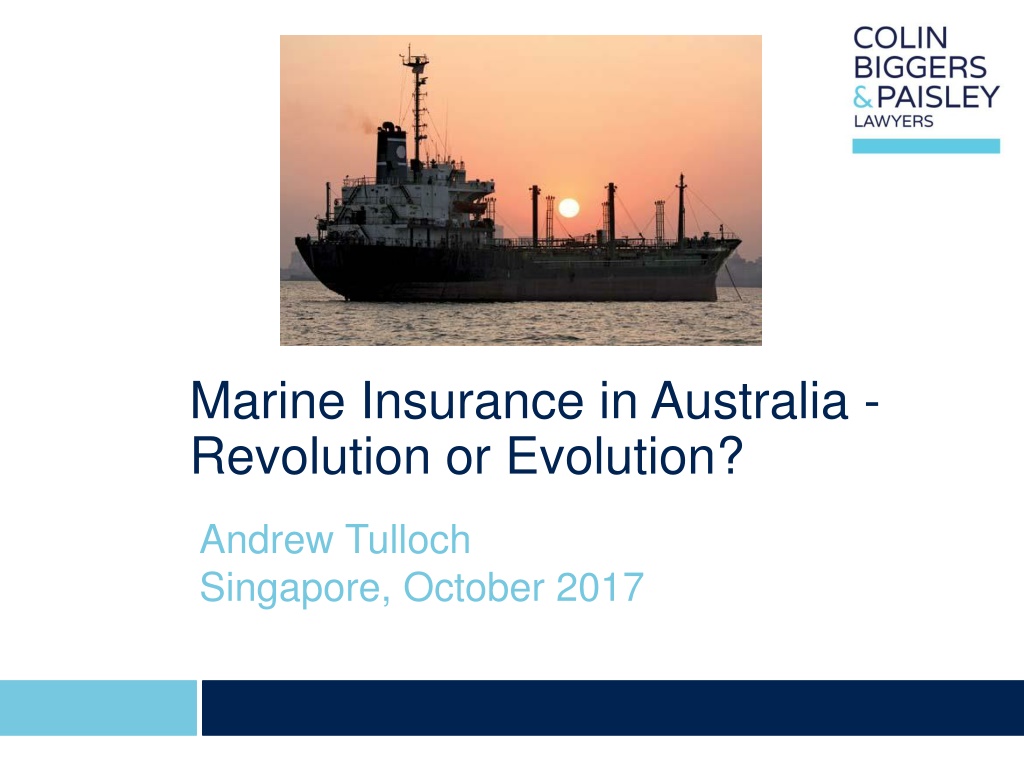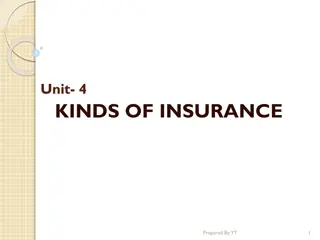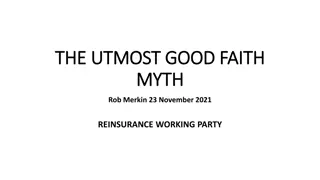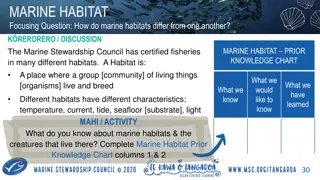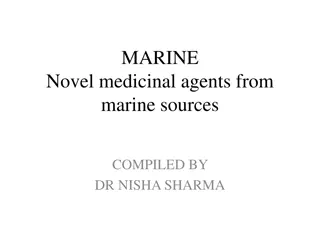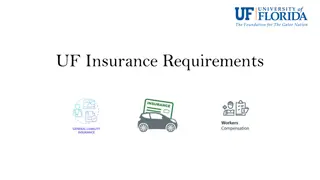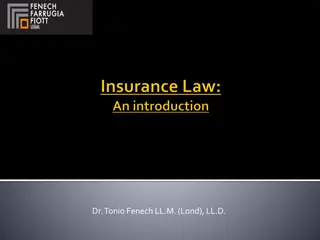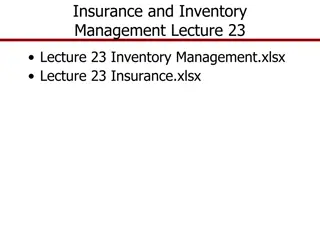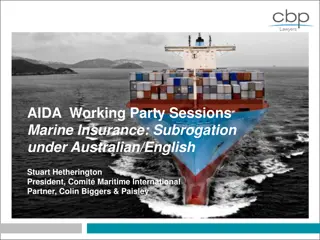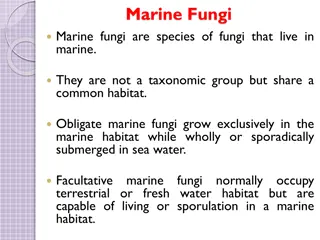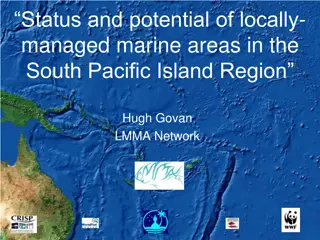Evolution of Marine Insurance in Australia: A Review of Historical Context and Reform Provisions
Exploring the evolution of marine insurance in Australia, this review delves into historical frameworks such as the Marine Insurance Acts of 1906 and 1909, as well as modern reforms influenced by the United Kingdom. Key principles adopted by the MLAANZ Committee and current recommendations surrounding the duty of utmost good faith in marine insurance contracts are discussed, highlighting the shift towards greater transparency and adherence to ethical standards.
Download Presentation

Please find below an Image/Link to download the presentation.
The content on the website is provided AS IS for your information and personal use only. It may not be sold, licensed, or shared on other websites without obtaining consent from the author. Download presentation by click this link. If you encounter any issues during the download, it is possible that the publisher has removed the file from their server.
E N D
Presentation Transcript
Marine Insurance in Australia - Revolution or Evolution? Andrew Tulloch Singapore, October 2017
Historical context Marine Insurance Act 1906 (UK) Marine Insurance Act 1909 (Cth) Insurance Contracts Act 1984 (Cth) Referral to the ALRC - 21/02/2000 ALRC Report - April 2001 Insurance Act 2015 (UK) MLAANZ Committee - August 2015 MLAANZ Submission to Attorney-General - 31/05/2017
Comparable Reform Provisions MIA 1909 (Cth) Section 8 Insurance Act 2015 (UK) Topic (MIA 1909) Mixed sea and land risks: inland waters. Insurance is Uberrimae Fidei: good faith. Disclosure by assured. Disclosure by agent effecting insurances. Representations pending negotiation of contract. Voyage and time policies: twelve months limit on time policies. Floating policy by ship or ships. Cancellation of contracts of marine insurance Warranties. When breach of warranty excused. Warranty of neutrality Contracts affecting rights of subrogation. Rights with respect to monies recovered from third parties. Interest on claims Section 14 Section 23 Sections 3 and 8 Section 4 Section 24 Section 25 Sections 8 and 9 Section 26 Section 31(2) Section 35 Section 37A Section 10 Section 10 Section 39(iii) Section 40 Section 10 Section 42(2) Sections 85A Section 87A Section 96
Principles adopted by MLAANZ Committee Endeavour not to stray too far beyond the reforms introduced in the United Kingdom; and Seek to give preference, wherever possible, to the recommendations contained in the ALRC Report, especially if they were based on Insurance Contracts Act wording.
Current Form: Section 23 Insurance is Uberrimae Fidei A contract of marine insurance is a contract based upon the utmost good faith, and, if the utmost good faith be not observed by either party, the contract may be avoided by the other party.
Recommendation: Section 23 Duty of Utmost Good Faith (1) A contract of marine insurance is a contract based on the utmost good faith and there is implied in such a contract a provision requiring each party to it to act towards the other party, in respect of any matter arising under or in relation to it, with the utmost good faith. (2) If reliance by a party to a contract of marine insurance on a provision of the contract would be to fail to act with the utmost good faith, the party may not rely on the provision. (3) Subsection (2) does not limit the operation of subsection (1).
Recommendation: Duty of Utmost Good Faith (cont.) (4) In deciding whether reliance by an insurer on a provision of a contract of marine insurance would be to fail to act with the utmost good faith, the court shall have regard to any notification of the provision that was given to the assured, whether a notification of a kind mentioned in this Act or otherwise. (5) The requirement that each party act toward the other party with the utmost good faith extends for the duration of the relationship between the parties set out in the contract of marine insurance except in relation to any claim or other aspect of the relationship which becomes the subject of litigation between the parties, in which case the requirement ceases when the litigation is commenced but only in relation to the claim or other aspect that is the subject of that litigation.
Current Form: Section 24 Disclosure by Assured (1) Subject to the provisions of this section, the assured must disclose to the insurer, before the contract is concluded, every material circumstance which is known to the assured, and the assured is deemed to know every circumstance which, in the ordinary course of business, ought to be known by him. If the assured fails to make such disclosure, the insurer may avoid the contract. (2) Every circumstance is material which would influence the judgment of a prudent insurer in fixing the premium, or determining whether he will take the risk. (3) In the absence of inquiry the following circumstances need not be disclosed, namely: (a) Any circumstance which diminishes the risk;
Current Form: Section 24 (cont.) (b) Any circumstance which is known or presumed to be known to the insurer. The insurer is presumed to know matters of common notoriety or knowledge, and matters which an insurer in the ordinary course of his business, as such, ought to know; (c) Any circumstance as to which information is waived by the insurer; (d) Any circumstance which it is superfluous to disclose by reason of any express or implied warranty. (4) Whether any particular circumstance, which is not disclosed, be material or not is, in each case, a question of fact. (5) The term "circumstance" includes any communication made to, or information received by, the assured.
Recommendation: Section 24 Replicated the recommendations made by ALRC i.e. repeal subsections (1) and (3)(d) and replace them with the following: Disclosure by Assured (1) Subject to the provisions of this section, the assured must disclose to the insurer, before the contract is concluded, every circumstance which is known to the assured or which a reasonable person in the circumstances could be expected to know, to be material. (3)(d) Any circumstance which it is superfluous to disclose by reason of any express or implied warranty or any express term of the contract.
Current Form: Section 25(a) Disclosure by agent effecting insurance Subject to the provisions of the preceding section as to circumstances which need not be disclosed, where an insurance is effected for the assured by an agent, the agent must disclose to the insurer (a) every material circumstance which is known to himself, and an agent to insure is deemed to know every circumstance which in the ordinary course of business ought to be known by, or to have been communicated to, him; and" Recommendation: We have reproduced the suggested wording of the ALRC that those words be replaced by the following: every material circumstance which is known to the agent or which a reasonable person in the circumstances could be expected to know, to be material; and
Current Form: Section 26 Representations pending negotiation of contract Every material representation made by the assured or his agent to the insurer during the negotiations for the contract, and before the contract is concluded, must be true. If it be untrue the insurer may avoid the contract. Recommendation: We have reproduced the suggested change of the ALRC, namely the deletion of the second sentence and the inclusion of Sections 26A and 26B.
Section 26A No other duty of disclosure 26A(1) Without otherwise limiting or restricting section 23 of this Act, this Act does not, and a contract of marine insurance may not, impose on an assured a duty of disclosure before the contract is concluded greater than that provided for by this Act. (2) A contract of marine insurance may include an express term providing for a duty of disclosure by the assured after the contract has been concluded.
Section 26B Remedies for non-disclosure and misrepresentation 26B(1) Subject to any contrary term in the contract, if there is a breach by the assured or its agent of the obligations in sections 24, 25 or 26 the following subsections apply. (2) If the breach is fraudulent the insurer is entitled to avoid the contract. (3) If the breach is not fraudulent and the insurer proves that the non-disclosure or misrepresentation induced it to enter into the contract: (a) if the insurer proves that it would not have entered into the contract if there had been no breach - the insurer is entitled to avoid the contract but must return the premium to the assured.
Remedies for non-disclosure and misrepresentation (cont.) (b) if the insurer proves that it would have entered into the contract but on different terms - the insurer: (i) is not entitled to avoid the contract; and (ii) is not liable to indemnify the assured for any loss proximately caused by the undisclosed or misrepresented circumstance; and (iii) is entitled to reduce any liability that it may have to the assured to reflect any variation in premium, deductible or excess that the insurer would have required if there had been no breach; and (iv) is entitled to cancel the policy in accordance with section 37A. See below re Section 37A (Cancellation of contracts).
Current Form: Section 39 Nature of Warranty (1) A warranty, in the following sections relating to warranties, means a promissory warranty, that is to say a warranty by which the assured undertakes that some particular thing shall or shall not be done, or that some conditions shall be fulfilled, or whereby he affirms or negatives the existence of a particular state of facts. (2) A warranty may be express or implied (3) A warranty, as above defined, is a condition which must be exactly complied with, whether it be material to the risk or not. If it be not so complied with, then, subject to any express provision in the policy, the insurer is discharged from liability as from the date of the breach of warranty, but without prejudice to any liability incurred by him before that date.
Recommendations: Retention of Section 39(1) and (2) and adoption of ALRC recommendation for 3 additional clauses together with inclusion of the word "warranty": (3) Subject to this Act no warranty and no express or implied term in a contract of marine insurance is a warranty or otherwise has the effect that any breach of it by the assured entitles the insurer to be discharged from any liability under the contract. (4) Subject to this Act, a warranty or an express term in a contract of marine insurance may provide that, if there is a breach by the assured of a warranty or an express term in the contract, the insurer is discharged from all liability to indemnify the assured for any loss proximately caused by the breach. (5) Without prejudice to any other burden of proof provided for by statute or common law, the insurer bears the burden of proving that there was a breach of a warranty or express term of the contract and the assured bears the burden of proving that the loss for which it seeks to be indemnified was not proximately caused by or attributable to, as the case requires, the breach.
Current Form: Section 40 When breach of warranty excused (1) Non-compliance with a warranty is excused when, by reason of a change of circumstances, the warranty ceases to be applicable to the circumstances of the contract, or when compliance with the warranty is rendered unlawful by any subsequent law. (2) Where a warranty is broken, the assured cannot avail himself of the defence that the breach has been remedied, and the warranty complied with, before loss. (3) A breach of warranty may be waived by the insurer.
Recommendations: Section 40 When breach of warranty is excused The insertion of the words "or a term of a contract of marine insurance" in section 40(1) wherever the word "warranty" appears. The repeal of section 40(2), and we have also suggested that section 40(3) (which will be re-numbered 40(2)) should now read: "A breach by the assured of any warranty or any term of a contract of marine insurance may be waived by the insurer".
Current Form: Section 42(2) Warranty of neutrality "Where a ship is expressly warranted "neutral" there is also an implied condition that, so far as the assured can control the matter, she shall be properly documented, that is to say, that she shall carry the necessary papers to establish her neutrality, and that she shall not falsify or suppress her papers, or use simulated papers. If any loss occurs through breach of this condition, the insurer may avoid the contract. Recommendation Deletion of the last sentence. (The ALRC recommended the deletion of Section 42 in its entirety.)
Current Form: Section 8 Mixed Sea and land risks (1) A contract of marine insurance may, by its express terms, or by usage of trade, be extended so as to protect the assured against losses on inland waters or on any land risk which may be incidental to any sea voyage. (2) Where a ship in course of building or the launch of a ship, or any adventure analogous to a marine adventure, is covered by a policy in the form of a marine policy, the provisions of this Act, in so far as applicable, shall apply thereto; but, except as by this section provided, nothing in this Act shall alter or affect any rule of law applicable to any contract of insurance other than a contract of marine insurance as by this Act defined.
Recommendation: Section 8 Mixed Sea and land risks Adopt the ALRC suggestion for the replacement of subsection 8(2) by the following: (2) Unless the contract otherwise provides, a ship in course of building or repairs, the launch of a ship, or any adventure analogous to a marine adventure is covered by the provisions of this Act, in so far as applicable; but, except as by this section provided, nothing in this Act shall alter or affect any rule of law applicable to any contract of insurance other than a contract of marine insurance as by this Act defined.
Current Form: Section 31(2) Voyage and Time Policies A time policy which is made for any time exceeding twelve months is invalid. Provided that a time policy may contain an agreement to the effect that, in the event of the ship being at sea or the voyage being otherwise not completed on the expiration of the policy, the subject matter of the insurance shall be held covered until the arrival of the ship at her destination, or for a reasonable time thereafter not exceeding thirty days; and the policy shall not be invalid on the grounds only that by reason of such agreement it may become available for a period exceeding twelve months. Recommendation: Repeal the Subsection.
Current Form: Section 35(1) Floating policy by ship or ships A floating policy is a policy which describes the insurance in general terms, and leaves the name of the ship or ships and other particulars to be defined by subsequent declaration. Recommendation: After the word "floating" the words "open or annual" be inserted That the title of this section should also read "Floating, open and annual policies"; and That after the word "ships" the words "or other insurable property" be inserted.
Current Form: Subsection 35(3) Unless the policy otherwise provides, the declarations must be made in the order of despatch or shipment. They must, in the case of goods, comprise all consignments within the terms of the policy, and the value of the goods or other property must be honestly stated, but an omission or erroneous declaration may be rectified even after loss or arrival, provided the omission or declaration was made in good faith. Recommendation: The words "shipment. They" be substituted by "shipment and they". The omission of the words "policy, and the" and their substitution by "policy. The".
Recommendation: Section 37A Cancellation of contracts of marine insurance Recommended the insertion of the following new provision dealing with cancellation of contracts of marine insurance which was proposed by the ALRC (in its draft bill it was identified as Section 47A): (1) Subject to any express term in a contract of marine insurance, where: (a) the assured has failed to comply with a provision of the contract; or (b) the assured did not comply with the duty of utmost good faith; or (c) the assured has made a fraudulent claim under the contract; or (d) this Act otherwise permits; the insurer may cancel the contract in accordance with this section.
Section 37A Cancellation of contracts of marine insurance (cont.) (2) An insurer who wishes to exercise a right to cancel a contract of marine insurance, whether under this section or pursuant to an express term of the contract, shall give notice in writing of the proposed cancellation to be assured. (3) Any notice of an insurer's intention to cancel a contract of marine insurance has effect to cancel the contract at any time specified in the notice after the earlier of the following times: (a) the time when another contract of marine insurance between the assured and the insurer or some other insurer, being a contract that is intended by the assured to replace the first- mentioned contract, is entered into; (b) 4 pm on the third business day after the day on which the notice was given to the assured.
Recommendation: Section 85A Contracts affecting rights of subrogation Suggested, as did the ALRC, new provisions dealing with rights of subrogation. The recommendation is as follows: (1) Where a contract of marine insurance includes a provision that has the effect of excluding or limiting the insurer's liability in respect of a loss by reason that the assured is a party to an agreement that excludes or limits a right of the assured to recover damages from a person other than the insurer in respect of the loss, the insurer may not rely on the provisions unless the insurer clearly informed the assured in writing, before the contract of marine insurance was entered into, of the effect of the provision. (2) The duty of disclosure does not require the assured to disclose the existence of a contract that so limits the assured's rights.
Recommendation: Section 87A Rights with respect to monies recovered from third parties Reproduced the recommendations made by the ALRC, which, themselves, were adopted as reforms to the Insurance Contracts Act 1984. They are: (1) Where money is recovered from a third party in respect of a loss that is wholly or partly the subject of a contract of marine insurance, that money shall, subject to any contrary agreement between the insurer and the assured, be distributed in the following manner and order. (2) The party or parties funding the recovery action shall be reimbursed for its or their administrative and legal costs incurred in connection with that action. If there is insufficient money recovered for full reimbursement, the parties shall be reimbursed pro rata.
Section 87A: Rights with respect to monies recovered from third parties (cont.) (3) If: (a) The insurer has funded the action under its rights of subrogation, it is entitled to retain an amount equal to the amount that it has paid to the assured under the contract of marine insurance. The assured is then entitled to be paid an amount that, together with any amount that it has received from the insurer under the contract of marine insurance, will indemnify it in full for its loss. (b) The assured has funded the action, it is entitled to retain an amount that, together with any amount that it has received from the insurer under the contract of marine insurance, will indemnify it in full for its loss. The insurer is then entitled to be paid an amount equal to the amount that it has paid to the assured under the contract of marine insurance. (c) The insurer and the assured have funded the action jointly, they are entitled to the amounts referred to in paragraphs (a) and (b). If there is insufficient money recovered for full reimbursement, the parties shall be reimbursed pro rata.
Section 87A: Rights with respect to monies recovered from third parties (cont.) (4) Any further amount recovered from the third party is to be paid to the parties to the contract of marine insurance pro rata in accordance with the ratio in which they contributed to the administrative and legal costs of the recovery action. (5) Notwithstanding anything else in this section, any separate or identifiable components in respect of interest are to be paid to the insurer and the assured in such proportions as fairly reflect the amounts that each has recovered from the third party and the periods of time for which each lost the use of its money.
Recommendation: Section 96 Interest on Claims Recommended the inclusion of the following provision: (1) Where an insurer is liable to pay to a person an amount under a contract of marine insurance or under this Act in relation to a contract of marine insurance, the insurer is also liable to pay interest on the amount to that person in accordance with this section except in respect of any period during which interest has already been calculated under any salvage award or general average claim to which the amount relates. (2) The period in respect of which interest is payable is the period commencing on the day as from which it was unreasonable for the insurer to have withheld payment of the amount and ending on whichever is the earlier of the following days: (a) the day on which the payment is made; (b) the day on which the payment is sent by post to the person to whom it is payable.
Section 96 - Interest on claims (cont.) (3) The rate at which interest is payable in respect of a day included in the period referred to in subsection (2) is the rate applicable in respect of that day that is prescribed by, or worked out in a manner prescribed by, the regulations under this Act. (4) This section applies to the exclusion of any other law that would otherwise apply. (5) In subsection (4): "law" means: (a) a statutory law of the Commonwealth, a State or Territory; or a (b) a rule of common law or equity." (6) The Governor-General may make regulations not inconsistent with this Act to prescribe the applicable rate of interest referred to in subsections (2) and (3).
